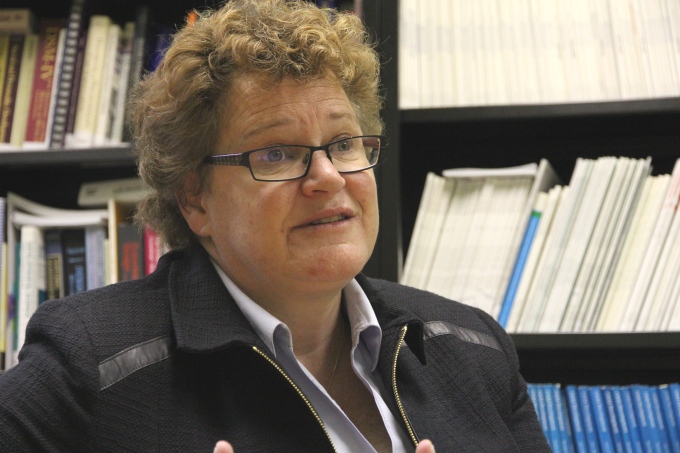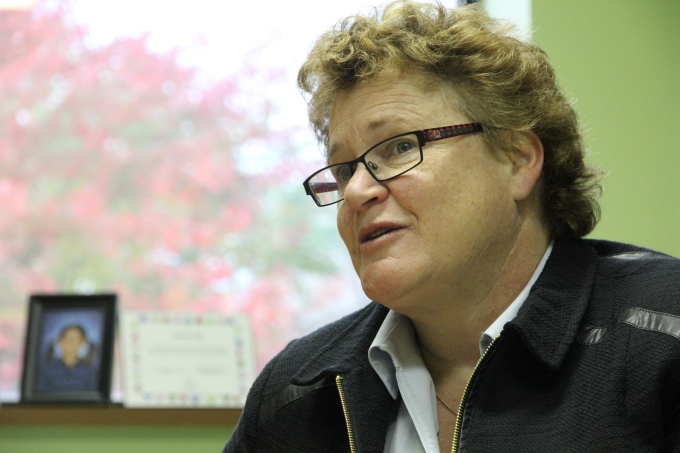Bullying expert honoured for changing lives
November 5, 2014
Share
A Canadian leader in bullying prevention, Queen’s University researcher Wendy Craig was honoured Monday with the Social Sciences and Humanities Research Council of Canada’s Partnership Award. One of five SSHRC Impact Awards, the honour recognizes a SSHRC‑funded formal partnership for its outstanding achievement in advancing research.
Communications Officer Anne Craig sat down with Dr. Craig to talk about her work and what the award means to her.

Anne Craig: Why did you choose this field of research?
Wendy Craig: I fell into what I do by accident. During my PhD I was involved in a study with Debra Pepler where we were looking at aggressive children’s interactions on the playground. When we filmed them to find out what was happening on the playground, we saw that the playground was really aggressive. In that initial study, through naturalist observation, we found that children were bullying each other once every seven and a half minutes and they were aggressive towards each other once every two minutes. That study really defined and launched my career. It ignited a strong interest in conducting applied research to understand how to support children and youth to develop optimally and have safe, healthy and respectful relationships.
By working as a researcher and getting that research into the hands of practitioners and people who work with children, I can be more effective in having a larger impact on the health and well-being of Canadian children and youth.
AC: What is the current focus of your work?
WC: In addition to my work as a professor and researcher, I am the scientific co-director of PREVNet along with Dr. Pepler at York University. PREVNet is comprised of more than 125 researchers across the country and 63 national organizations that work with children and youth. Its goal is to provide practitioners with the scientific information that they need to be more effective in their practice. We also want practitioners to identify the burning questions we should tackle as researchers. My work has become about knowledge mobilization and bridging the gap between science, practice and policy through the process of bringing researchers and organizations together to co-create research, resources and tools.

AC: Why is your work important?
WC: I believe that this work is important because it has to do with the health and well-being of children and youth. We recently finished a study for the Public Health Agency of Canada where we found that high-quality relationships with parents, peers, teachers, adults at school and the community positively impact physical and mental health outcomes, as well as academic and social ones. The concern Dr. Pepler and I had when we did that study was fewer children in Canada are reporting having high-quality relationships with parents, teachers, schools, and in the neighborhood. Bullying is a relationship problem and is related to long-term negative effects. We have learned that children don’t grow out of bullying; it’s a problem that grows more significant as they get older. Part of what we do is look at how we minimize that long-term impact through prevention and intervention.
AC: What does the Partnership Award mean for you and your career?
WE: The award really recognizes the work of the network. This work could not be as effective without all members of the network contributing their unique skills, expertise, resources, dedication and time. Over time, through the generous funding of SSHRC through the National Centres of Excellence program, we have built a network that has a common vision, and is based on the foundation of trusting relationships. This award celebrates the incredible accomplishments that happen when outstanding organizations, researchers and students come together to co-create projects that are driven by science and meet the needs of our partners. Relationships matter to create an effective network that has conducted more than 200 projects in the last seven years. Creating PREVNet was a dream and we are excited we are now having an impact and making a difference in the lives of Canadian youth.
AC: What is your focus for the future?
WE: There is much work to do in Canada to improve children and youth development. We rank 25 out of 28 on relationships. Given that healthy development depends on healthy relationships, we need to engage and support adults in all the places that children and youth live, learn, work and play. We will work with our partners to continue to co-create research projects, and develop evidence-based education and training, assessment and evaluation tools, prevention and intervention strategies, and enhanced policy. Through PREVNet we are leading the world in an unprecedented manner in creating a social-cultural change in reducing bullying through promoting relationships.